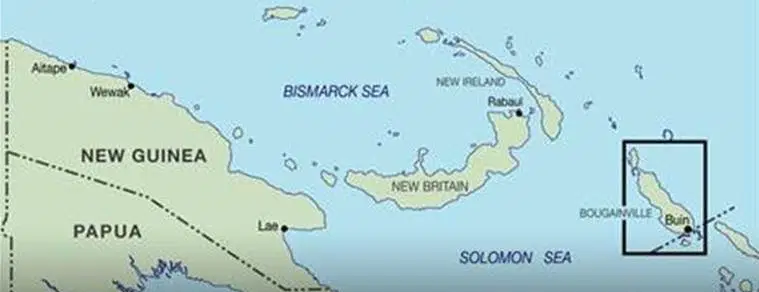World History
Bougainville
- 23 Nov 2019
- 4 min read
Why in News
On November 23, the people of Bougainville (a small South Pacific island), will vote for a referendum to gain independence from Papua New Guinea. If the referendum is passed, Bougainville would become the world’s newest and possibly the smallest independent country.
Background
- Bougainville is currently a province of Papua New Guinea- one of the most populous Pacific island states. It forms the part of the Solomon Islands archipelago.
- Bougainville has a population of around 300,000 people comprising of 21 distinct language groups.
- In the late 1970s, a decentralized system of provincial government was introduced in Bougainville. The current autonomy arrangements were implemented following the constitutional enactment of the Bougainville Peace Agreement.
- The Bougainville Peace Agreement, signed in 2001, brought autonomy and an end to the violent conflict between the people of Bougainville and the government of Papua New Guinea.
Issues Leading to Referendum
- The subsequent dissatisfaction among Bougainvilleans over implementation of the agreed arrangements for Bougainville autonomy (2001), particularly in regard to the constitutionally guaranteed financial grants was the major bone of contention.
- The Autonomy Bougainville Government (ABG) was legally entitled to the financial grants but the Papua New Guinea National Government did not provide the same in accordance with the ABG’s calculations.
- Also, the historic plunder of the resource-rich island and the unequal distribution of wealth that followed was the major issue.
- Bougainville has large deposits of copper.
- The Panguna mine (also known as the Bougainville Copper Mine) holds some of the world’s largest reserves of copper. It is the world’s largest open-cut copper mine.
- The export of copper extracted from the Panguna mine contributed significantly to Papua New Guinea’s economy.
- The mine also created job opportunities for people from Papua New Guinea and Australia, leading to conflicts with Bougainvilleans who reported cases of discrimination and racism at the hands of foreigner mine workers.
- Mining activities over the years also caused environmental degradation of Bougainville’s lands and water.
Way Forward
- The referendum is not binding and would still have to be passed by the Government and the Parliament of Papua New Guinea, in consultation with the Autonomous Bougainville Government before a final decision is made.
- If Bougainville becomes independent, the immediate steps would involve putting in place the law and order, economic opportunities, and access to education.
- If the referendum is passed it will have implications on countries like Australia, New Zealand, and China in general, and other provinces of Papua New Guinea in specific. The stability of the region of which Bougainville is part is clearly important to Australia and other nations.







